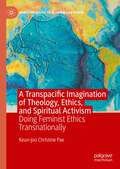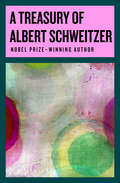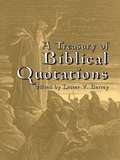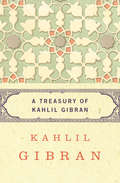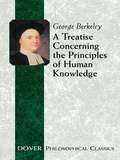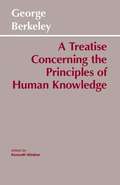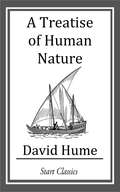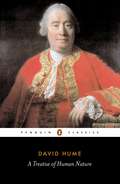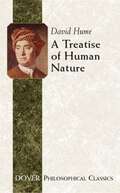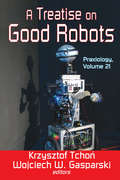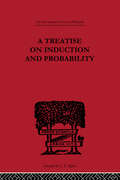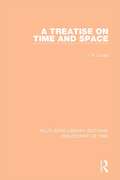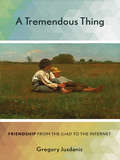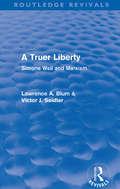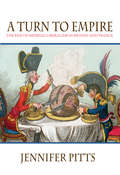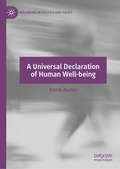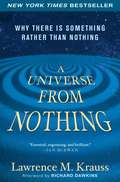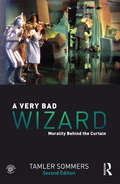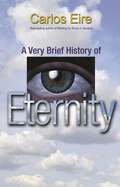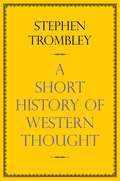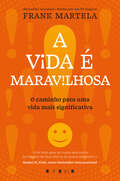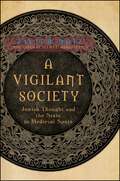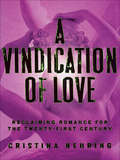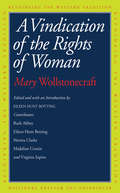- Table View
- List View
A Transpacific Imagination of Theology, Ethics, and Spiritual Activism: Doing Feminist Ethics Transnationally (New Approaches to Religion and Power)
by Keun-joo Christine PaeDespite prolific feminist voices in Christian ethics, transnational perspectives are still underdeveloped. Similarly, ‘secular’ transnational feminist scholarship often overlooks religious faith, rituals, and spirituality, crucial to many women’s liberation movements across the globe. This book aims to fill these gaps in Christian and secular feminist scholarships by constructing a transnational feminist theo-ethics. Furthermore, by bringing the theological and the transnational together, the book offers an alternative tool in analyzing social identities beyond intersectionality (i.e., interstitial approach and interstitial integrity) and thus, renews feminist theological understandings, especially of time, memories, and healing beyond linear approaches. A renewed analytical tool would help the readers critically reinterrogate the global power structure buttressed by empire, militarized capitalism, and heteropatriarchal religious ideologies at the cost of raced, sexed, and classed bodies. At the same time, the book would create space where readers create and recreate theo-ethical visions for global peace and justice constructed upon transnational feminist praxis of solidarity and spiritual activism. Case studies offer concrete sites to inform readers about how to use transnational feminist theories at a micro- and macropolitical levels, and produce transnational feminist knowledge of God, spiritual activism, and solidarity. This book is written for graduate and advanced undergraduate students in religion, gender studies, and Asian/American studies to critically engage in the political, the theological, and the spiritual from transnational perspectives not as observers but as active participants in global politics.
A Treasury of Albert Schweitzer
by Albert SchweitzerCollected here in a single volume are the most important philosophical writings of Albert Schweitzer, one of the greatest thinkers and humanitarians of our time. Carefully chosen from among his many written works, the selections in this anthology illuminate and amplify Dr. Schweitzer&’s cardinal principle of belief—a reverence for life. Among the important and revealing works included are &“Pilgrimage to Humanity,&” which outlines his philosophy of culture, the early influences in his life, and his ideal of world peace; &“The Light Within Us,&” one of the twentieth century&’s most significant and beautiful statements of one man&’s faith in his fellow man; and &“Reverence for Life,&” which states, with great clarity and conviction, the essence of Schweitzer&’s wisdom. Because of his legendary fame as a medical missionary, other equally important and outstanding aspects of Schweitzer&’s life are not as well known. Readers of this book will realize that Albert Schweitzer was a truly creative thinker, whose concern with the problems of the human spirit and whose methods of expressing this concern have raised him to the stature of one of the world&’s foremost philosophers.
A Treasury of Albert Schweitzer (Biography Index Reprint Ser.)
by Albert SchweitzerCollected here in a single volume are the most important philosophical writings of Albert Schweitzer, one of the greatest thinkers and humanitarians of our time. Carefully chosen from among his many written works, the selections in this anthology illuminate and amplify Dr. Schweitzer&’s cardinal principle of belief—a reverence for life. Among the important and revealing works included are &“Pilgrimage to Humanity,&” which outlines his philosophy of culture, the early influences in his life, and his ideal of world peace; &“The Light Within Us,&” one of the twentieth century&’s most significant and beautiful statements of one man&’s faith in his fellow man; and &“Reverence for Life,&” which states, with great clarity and conviction, the essence of Schweitzer&’s wisdom. Because of his legendary fame as a medical missionary, other equally important and outstanding aspects of Schweitzer&’s life are not as well known. Readers of this book will realize that Albert Schweitzer was a truly creative thinker, whose concern with the problems of the human spirit and whose methods of expressing this concern have raised him to the stature of one of the world&’s foremost philosophers.
A Treasury of Biblical Quotations
by Lester V. BerreyDesigned as a quick and easy reference tool, this thesaurus of scripture classifies sacred texts from the King James Version of both the Old and New Testaments by topic. Arranged alphabetically by subject, the quotes appear under headings ranging from ability, courage, and fidelity to sorrow, temptation, and zeal.
A Treasury of Kahlil Gibran
by Kahlil GibranPassionate and spiritual writings uncovering the philosophical foundations of one of the twentieth century&’s greatest thinkersKahlil Gibran&’s works are known throughout the world for their lyrical grandeur, wisdom, and insights drawn from the everyday sufferings of man. This nine-book collection captures one of modern history&’s titanic literary figures at his best. Texts such as &“The Secret of the Heart,&” &“Laughter and Tears,&” and &“Song of the Flower&” reveal the vivid splendor of life through Gibran&’s gifted similes and symbolism. Passionate and unforgettable, these verses of lyric prose impart to the reader a grand symphony of sparking joys epitomizing the qualities that have made Gibran one of the world&’s most eminent philosophical virtuosos.
A Treatise Concerning the Principles of Human Knowledge (Dover Philosophical Classics)
by George BerkeleyIf a tree falls in the forest and no one is present to hear it, does it make a sound? It does not, according to George Berkeley. Originally published in 1710, this landmark of Western philosophy introduced a revolutionary concept: immaterialism, which asserts that to be is to perceive or be perceived. An Irish clergyman who spent his entire philosophical career as a churchman, Berkeley linked his investigations to his religious interests. A Treatise Concerning the Principles of Human Knowledge opens with an assault on Locke’s theory of abstract ideas and proceeds with arguments that sensible qualities exist only when perceived as ideas. Physical objects, he claims, are no more than collections of qualities, and these sensible objects, too, are merely ideas. Berkeley relates his position to the achievements of eighteenth-century science, and proclaims the compatibility of immaterialism with traditional religion.The fullest expression of Berkeley’s doctrine of immaterialism, this classic work influenced British philosophers from David Hume to Bertrand Russell and the other logical positivists. It is essential reading for all students of philosophy.
A Treatise Concerning the Principles of Human Knowledge Part 1
by George Berkeley Kenneth WinklerKenneth Winkler's esteemed edition of Berkeley's Principles is based on the second edition (London, 1734), the last one published in Berkeley's lifetime. Like other members of Hackett's philosophical classics series, it features editorial elements found to be of particular value to students and their teachers: analytical table of contents; chronology of the author's life; selected bibliography; note on the text; glossary; and index.
A Treatise of Human Nature
by David HumeDavid Hume was a Scottish philosopher, economist, and historian. He is an important figure in Western philosophy, and in the history of the Scottish Enlightenment. Hume first gained recognition and respect as a historian, but academic interest in Hume's work has in recent years centered on his philosophical writing. His "History of England" was the standard work on English history for many years, until Macaulay's "The History of England from the Accession of James the Second". Hume was the first philosopher of the modern era to produce a naturalistic philosophy. This philosophy partly consisted in rejection of the historically prevalent conception of human minds as being miniature versions of the divine mind. This doctrine was associated with a trust in the powers of human reason and insight into reality, which possessed God's certification. Hume's scepticism came in his rejection of this 'insight ideal', and the (usually rationalistic) confidence derived from it that the world is as we represent it. Instead, the best we can do is to apply the strongest explanatory and empirical principles available to the investigation of human mental phenomena, issuing in a quasi-Newtonian project, Hume's 'Science of Man'. Hume was heavily influenced by empiricists John Locke and George Berkeley, along with various French-speaking writers such as Pierre Bayle, and various figures on the English-speaking intellectual landscape such as Isaac Newton, Samuel Clarke, Francis Hutcheson, and Joseph Butler.
A Treatise of Human Nature
by David HumeOne of the most significant works of Western philosophy, Hume's Treatise was published in 1739-40, before he was thirty years old. A pinnacle of English empiricism, it is a comprehensive attempt to apply scientific methods of observation to a study of human nature, and a vigorous attack upon the principles of traditional metaphysical thought. With masterly eloquence, Hume denies the immortality of the soul and the reality of space; considers the manner in which we form concepts of identity, cause and effect; and speculates upon the nature of freedom, virtue and emotion. Opposed both to metaphysics and to rationalism, Hume's philosophy of informed scepticism sees man not as a religious creation, nor as a machine, but as a creature dominated by sentiment, passion and appetite.
A Treatise of Human Nature (Dover Philosophical Classics Ser.)
by David HumePublished in the mid-18th century and received with indifference (it "fell dead-born from the press," noted the author), David Hume's comprehensive three-volume A Treatise of Human Nature has withstood the test of time and has had enormous impact on subsequent philosophical thought. Hume — whom Kant famously credited with having "interrupted my dogmatic slumber and gave my investigations in the field of speculative philosophy a quite new direction" — intended this work as an observationally grounded study of human nature. He employed John Locke's empiric principles, constructing a theory of knowledge to serve as a foundation for the evaluation of metaphysical ideas.Reprinted here in one volume, the Treatise begins with an examination of the nature of ideas: their origins and connections, modes and substance, and abstract qualities. The work's considerations of existence, knowledge, and identity explore the ways in which people use these concepts as a basis for firm but unproven beliefs. The second part surveys the passions, from pride and humility to contempt and respect, analyzing their roles in human choices and actions. The book concludes with a meditation on morals and an in-depth explanation of the perceived distinctions between virtue and vice.One of philosophy's most important works and a key to modern studies of 18th-century Western thought, A Treatise of Human Nature is essential reading for all students of philosophy and history.
A Treatise on Good Robots
by Krzysztof TchonThis volume investigates the ways emerging technologies in the fields of robotics and bio-robotics are influencing society. It necessarily considers both philosophical and technological study of robots, including what it means for robots to exist as good and moral entities, and how they benefit humans and enhance their quality of life. Contributors address artificial intelligence and social functions as well as technical matters. Chapters are wide-ranging, and consider robots in science fiction; the need for designers to create moral robots; specific technology; and the development of biological robots. Also addressed are robotic technologies already enhancing human bodies, such as exoskeletons that allow paraplegics to walk. The contributors foresee robots becoming involved not only in mundane domestic tasks such as washing dishes, but also in providing health care to the disabled and companionship to the elderly. This volume offers exciting philosophical reflections that unveil new connections between robotics and praxiology and their practical applications.
A Treatise on Induction and Probability (International Library of Philosophy)
by Georg Henrik Von WrightFirst published in 2000. Routledge is an imprint of Taylor & Francis, an informa company.
A Treatise on Time and Space (Routledge Library Editions: Philosophy of Time #2)
by J. R. LucasOriginally published in 1976. This comprehensive study discusses in detail the philosophical, mathematical, physical, logical and theological aspects of our understanding of time and space. The text examines first the many different definitions of time that have been offered, beginning with some of the puzzles arising from our awareness of the passage of time and shows how time can be understood as the concomitant of consciousness. In considering time as the dimension of change, the author obtains a transcendental derivation of the concept of space, and shows why there has to be only one dimension of time and three of space, and why Kant was not altogether misguided in believing the space of our ordinary experience to be Euclidean.The concept of space-time is then discussed, including Lorentz transformations, and in an examination of the applications of tense logic the author discusses the traditional difficulties encountered in arguments for fatalism. In the final sections he discusses eternity and the beginning and end of the universe. The book includes sections on the continuity of space and time, on the directedness of time, on the differences between classical mechanics and the Special and General theories of relativity, on the measurement of time, on the apparent slowing down of moving clocks, and on time and probability.
A Tremendous Thing: Friendship from the "Iliad" to the Internet
by Gregory Jusdanis"Why did you do all this for me?" Wilbur asked. "I don't deserve it. I've never done anything for you." “You have been my friend,” replied Charlotte. “That in itself is a tremendous thing.” —from Charlotte's Web by E. B. White Friendship encompasses a wide range of social bonds, from playground companionship and wartime camaraderie to modern marriages and Facebook links. For many, friendship is more meaningful than familial ties. And yet it is our least codified relationship, with no legal standing or bureaucratic definition. In A Tremendous Thing, Gregory Jusdanis explores the complex, sometimes contradictory nature of friendship, reclaiming its importance in both society and the humanities today. Ranging widely in his discussion, he looks at the art of friendship and friendship in art, finding a compelling link between our need for friends and our engagement with fiction. Both, he contends, necessitate the possibility of entering invented worlds, of reading the minds of others, and of learning to live with people. Investigating the ethics, aesthetics, and politics of friendship, Jusdanis draws from the earliest writings to the present, from the Epic of Gilgamesh and the Iliad to Charlotte's Web and “Brokeback Mountain,” as well as from philosophy, sociology, evolutionary biology, psychology, and political theory. He asks: What makes friends stay together? Why do we associate friendship with mourning? Does friendship contribute to the formation of political communities? Can friends desire each other? The history of friendship demonstrates that human beings are a mutually supportive species with an innate aptitude to envision and create ties with others. At a time when we are confronted by war, economic inequality, and climate change, Jusdanis suggests that we reclaim friendship to harness our capacity for cooperation and empathy.
A Truer Liberty: Simone Weil and Marxism (Routledge Revivals)
by Victor Seidler Laurence A. BlumSimone Weil — philosopher, trade union militant, factory worker — developed a penetrating critique of Marxism and a powerful political philosophy which serves an alternative both to liberalism and to Marxism. In A Truer Liberty, originally published in 1989, Blum and Seidler show how Simone Weil’s philosophy sought to place political action on a firmly moral basis. The dignity of the manual worker became the standard for political institutions and movements. Weil criticized Marxism for its confidence in progress and revolution and its attendant illusory belief that history is on the side of the proletariat.Blum and Seidler relate Weil’s work to influential trends in political philosophy today, from analytic Marxism to central traditions within liberal thought. The authors stress the importance of Weil’s work for understanding liberation theology, Catholic radicalism, and, more generally, social movements against oppression which are closely tied to religion and spirituality.
A Turn to Empire: The Rise of Imperial Liberalism in Britain and France
by Jennifer PittsA dramatic shift in British and French ideas about empire unfolded in the sixty years straddling the turn of the nineteenth century. As Jennifer Pitts shows in A Turn to Empire, Adam Smith, Edmund Burke, and Jeremy Bentham were among many at the start of this period to criticize European empires as unjust as well as politically and economically disastrous for the conquering nations. By the mid-nineteenth century, however, the most prominent British and French liberal thinkers, including John Stuart Mill and Alexis de Tocqueville, vigorously supported the conquest of non-European peoples. Pitts explains that this reflected a rise in civilizational self-confidence, as theories of human progress became more triumphalist, less nuanced, and less tolerant of cultural difference. At the same time, imperial expansion abroad came to be seen as a political project that might assist the emergence of stable liberal democracies within Europe. Pitts shows that liberal thinkers usually celebrated for respecting not only human equality and liberty but also pluralism supported an inegalitarian and decidedly nonhumanitarian international politics. Yet such moments represent not a necessary feature of liberal thought but a striking departure from views shared by precisely those late-eighteenth-century thinkers whom Mill and Tocqueville saw as their forebears. Fluently written, A Turn to Empire offers a novel assessment of modern political thought and international justice, and an illuminating perspective on continuing debates over empire, intervention, and liberal political commitments.
A Universal Declaration of Human Well-being (Wellbeing in Politics and Policy)
by Annie Austin"This book makes a vital contribution to the current literature on human well-being. Through a condensed but incisive analysis of a wide range of sources, from ancient philosophy to the political constitutions of modern nation states, Annie Austin builds a strong case for a universal core of human well-being. Her identification of the vital importance of an "infrastructure of sociality" should be noted by academicians, politicians and policy-makers who are seeking to use well-being as a means of rethinking how we are to meet the challenges of the 21st century."—Allister McGregor, University of Sheffield, UKThis book examines the differing policy implications of the different conceptions of wellbeing across the world. There is an ongoing debate, in both philosophical and policy circles, about the legitimacy of universal frameworks of wellbeing. Who should decide what it means to live a good life? Is it possible to arrive at a shared definition, or is there simply too much individual and cultural diversity in conceptions of the good life? By devising an ‘overlapping consensus’ on wellbeing, the book represents a starting point for political negotiation and public deliberation about the kinds of societies we (as collectivities) wish to create, and the kinds of lives we (as individuals embedded in those societies) want to live. The book provides philosophically-informed public policy insight, making it a valuable contribution to interdisciplinary wellbeing scholarship.
A Universe from Nothing: Why There Is Something Rather than Nothing (Playaway Adult Nonfiction Ser.)
by Lawrence M. Krauss Richard DawkinsBestselling author and acclaimed physicist Lawrence Krauss offers a paradigm-shifting view of how everything that exists came to be in the first place."Where did the universe come from? What was there before it? What will the future bring? And finally, why is there something rather than nothing?"One of the few prominent scientists today to have crossed the chasm between science and popular culture, Krauss describes the staggeringly beautiful experimental observations and mind-bending new theories that demonstrate not only can something arise from nothing, something will always arise from nothing. With a new preface about the significance of the discovery of the Higgs particle, A Universe from Nothing uses Krauss's characteristic wry humor and wonderfully clear explanations to take us back to the beginning of the beginning, presenting the most recent evidence for how our universe evolved--and the implications for how it's going to end. Provocative, challenging, and delightfully readable, this is a game-changing look at the most basic underpinning of existence and a powerful antidote to outmoded philosophical, religious, and scientific thinking.
A Very Bad Wizard: Morality Behind the Curtain
by Tamler SommersIn the first edition of A Very Bad Wizard: Morality Behind the Curtain – Nine Conversations, philosopher Tamler Sommers talked with an interdisciplinary group of the world’s leading researchers—from the fields of social psychology, moral philosophy, cognitive science, and primatology—all working on the same issue: the origins and workings of morality. Together, these nine interviews pulled back some of the curtain, not only on our moral lives but—through Sommers’ probing, entertaining, and well informed questions—on the way morality traditionally has been studied. This Second Edition increases the subject matter, adding eight additional interviews and offering features that will make A Very Bad Wizard more useful in undergraduate classrooms. These features include structuring all chapters around sections and themes familiar in a course in ethics or moral psychology; providing follow-up podcasts for some of the interviews, which will delve into certain issues from the conversations in a more informal manner; including an expanded and annotated reading list with relevant primary sources at the end of each interview; presenting instructor and student resources online in a companion website. The resulting new publication promises to synthesize and make accessible the latest interdisciplinary research to offer a brand new way to teach philosophical ethics and moral psychology.
A Very Brief History of Eternity
by Carlos EireFrom the author of Waiting for Snow in Havana, a brilliant cultural history of the idea of eternityWhat is eternity? Is it anything other than a purely abstract concept, totally unrelated to our lives? A mere hope? A frightfully uncertain horizon? Or is it a certainty, shared by priest and scientist alike, and an essential element in all human relations?In A Very Brief History of Eternity, Carlos Eire, the historian and National Book Award–winning author of Waiting for Snow in Havana, has written a brilliant history of eternity in Western culture. Tracing the idea from ancient times to the present, Eire examines the rise and fall of five different conceptions of eternity, exploring how they developed and how they have helped shape individual and collective self-understanding.A book about lived beliefs and their relationship to social and political realities, A Very Brief History of Eternity is also about unbelief, and the tangled and often rancorous relation between faith and reason. Its subject is the largest subject of all, one that has taxed minds great and small for centuries, and will forever be of human interest, intellectually, spiritually, and viscerally.
A Very Short History of Western Thought
by Stephen TrombleyA masterly distillation of two-and-a-half millennia of intellectual history, and a readable and entertaining crash course in Western philosophyShort, sharp, and entertaining, this survey covers the development of all aspects of the Western philosophical tradition from the ancient Greeks to the present day. No major representative of any significant strand of Western thought escapes the author's attention: the Christian Scholastic theologians of the Middle Ages, the great philosophers of the Enlightenment, the German idealists from Kant to Hegel; the utilitarians Bentham and Mill; the transcendentalists Emerson and Thoreau; Kierkegaard and the existentialists; the analytic philosophers Russell, Moore, Whitehead, and Wittgenstein; and—last but not least—the four shapers-in-chief of our modern world: Karl Marx, Charles Darwin, Sigmund Freud, and Albert Einstein.
A Vida É Maravilhosa: O Caminho para Uma Vida Mais Significativa
by Frank MartelaUm guia inspirador que oferece ferramentas práticas e facilmente aplicáveis para uma experiência de vida mais positiva, gratificante e significativa. O que dá sentido à nossa vida? Como podemos lidar com a ausência de um propósito existencial? Valerá a pena focarmo-nos na busca permanente de felicidade? Perceber o sentido da própria existência é fundamental para vivermos com motivação, satisfação e alegria e, sobretudo, para conseguirmos tirar o máximo partido da vida. Vários estudos sugerem que as pessoas com uma forte noção do seu propósito existencial têm mais saúde e vivem mais e melhor. Neste livro, Frank Martela esclarece por que motivo sentimos uma insatisfação permanente e estamos constantemente à procura de algo mais. Numa série de reflexões perspicazes e motivadoras, dotadas de um refinado sentido de humor, o autor analisa as grandes questões existenciais no contexto da vida moderna, oferecendo uma nova abordagem para alcançarmos uma vida mais plena, que passa por fazermos coisas significativas para nós (realização pessoal)de uma forma que nos torne significativos para outras pessoas (realização social). «Um livro para ler vezes sem conta na viagem de descoberta do nosso propósito.» Daniel H. Pink, autor bestseller internacional «Apoiando-se habilmente em áreas como a psicologia, a filosofia e a literatura, este livro irá ajudá-lo a viver uma vida com significado. Uma leitura tão gratificante e divertida quanto enriquecedora.» Emma Seppala, diretora científica do Centro de Educação e Pesquisa sobre Compaixão e Altruísmo da Universidade de Stanford «Um livro brilhante e encantador que aborda as questões mais grandiosas da vida com simplicidade, humor e perspicácia. Se tem curiosidade sobre o sentido da vida — e quem não tem? —, este livro é um recurso valioso.» Roy F. Baumeister, autor bestseller internacional «Neste ensaio edificante, fruto de um cuidadoso trabalho de pesquisa, Frank Martela reúne algumas das ideias mais fascinantes da história, da filosofia e da psicologia para abordar a questão mais premente de todas: o que torna a vida significativa.» Emily Esfahani Smith, autora bestseller internacional
A Vigilant Society: Jewish Thought and the State in Medieval Spain
by Javier RoizA Vigilant Society presents a provocative hypothesis that argues that Western society as we know it emerged from the soil of Jewish intellectual advances in the thirteenth century, especially those formulated on the Iberian Peninsula. A paradigmatic shift began to occur, one that abandoned the pre–Gothic Sephardic wisdom found in, for example, the writings of Maimonides in favor of what author Javier Roiz calls the "vigilant society." This model embraces a conception of politics that includes a radical privatization of an individual's interior life and—especially as adopted and adapted in later centuries by Roman Catholic and Calvinist thinkers—is marked by a style of politics that accepts the dominance of power and control as given. Vigilant society laid the foundation for the Western understanding of politics and its institutions and remains pervasive in today's world.
A Vindication of Love: Reclaiming Romance for the Twenty-First Century
by Cristina Nehring"A fierce and lively book. . . .This is one of those rare books that could make people think about their intimate lives in a new way." — New York Times Book Review “A rousing defense of imprudent ardor and romantic excess. . . . It’s difficult to deny that [Nehring] is on to something.” — Wall Street JournalA thinking person’s “guide” that makes the case for love in an age both cynical about and fearful of strong passion. Bold and challenging, A Vindication of Love has inspired praise and controversy, and brilliantly reinvigorated the romance debate. A perfect choice for readers of Alain de Botton’s How Proust Can Change Your Life and Pierre Bayard’s How to Talk About Books You Haven’t Read.
A Vindication of the Rights of Woman
by Mary Wollstonecraft Eileen Hunt BottingMary Wollstonecraft's visionary treatise, originally published in 1792, was the first book to present women's rights as an issue of universal human rights. Ideal for coursework and classroom study, this comprehensive edition of Wollstonecraft's heartfelt feminist argument includes illuminating essays by leading scholars that highlight the author's significant contributions to modern political philosophy, making a powerful case for her as one of the most substantive political thinkers of the Enlightenment era. No other scholarly work to date has examined as closely both the ideological moorings and the enduring legacy of Wollstonecraft's groundbreaking and courageous discourse.
